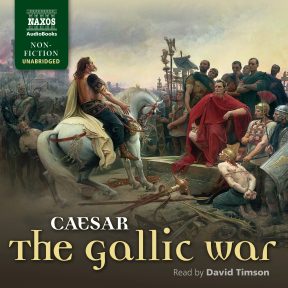The NAB Blog
Julius Caesar’s The Gallic War – History or Propaganda?
By Anthony Anderson
3 August 2023
 Many of us of a certain generation will be familiar with Julius Caesar and his activities in Gaul through the animated adventures of Asterix and Obelix. The opening of The Gallic War – ‘Gallia est omnis divisa in partes tres’ (‘The whole of Gaul is divided into three parts’) – will be familiar to generations of school pupils for whom the text was a staple of Latin classes, though these would have excluded the fictitious fourth part of Gaul (led by the chief Vitalstatistix) on which René Goscinny and Albert Uderzo based their cartoons.
Many of us of a certain generation will be familiar with Julius Caesar and his activities in Gaul through the animated adventures of Asterix and Obelix. The opening of The Gallic War – ‘Gallia est omnis divisa in partes tres’ (‘The whole of Gaul is divided into three parts’) – will be familiar to generations of school pupils for whom the text was a staple of Latin classes, though these would have excluded the fictitious fourth part of Gaul (led by the chief Vitalstatistix) on which René Goscinny and Albert Uderzo based their cartoons.
There are two good reasons why The Gallic War has been so often studied in schools. First and foremost, the style and language of Caesar’s Latin is simple, which makes it an ideal original text to study for teenage students. Caesar’s vocabulary is limited and the structure of his sentences often repetitive. Secondly, the narrative is rare in that it gives us a first-hand account of a military conquest by the Romans at a critical juncture in their history (58–51 B.C.), when the late Republic was intermittently beset by civil war. We might wonder whether The Gallic War was written in ‘plain’ Latin in order to reach the largest number of people – throughout his political career Caesar positioned himself as a ‘man of the people’.
there is a risk that we apply 21st-century mores, even an Anglo-Saxon modesty, to a culture that is very different from our own
Apart from the simplicity of the writing, there are several other notable aspects of Caesar’s style. The most remarkable is that, in common with other ancient writers of history such as Xenophon in his Anabasis, he writes about himself in the third person. Most obviously, this lends the text an air of objectivity and independence. Additionally – and like several other writers in antiquity – the tense in which Caesar writes shifts freely, and often abruptly, with frequent use of the historic present to heighten the immediacy of the action at given moments:
‘He sends his legate Titus Labienus with the cavalry against the Treveri, who live close to the Rhine. He orders him to visit the Remi and other Belgae and secure their loyalty…’ (Book 3, 11)
Thirdly, and perhaps to the chagrin of any actor reading this text for an audiobook, Caesar breaks the convention of classical historiography in his restrained use of direct speech, which was often used by other writers at important moments in a narrative – such as when giving the main protagonists lengthy speeches. Caesar, however, presents no direct speech in the first three books of The Gallic War, and thereafter the longest direct speeches are generally given to particular Gauls – often to emphasise their barbarity –, for example, Critognatus in Book 7. Caesar himself has none, which is strange as it would have been a prime opportunity for self-promotion, particularly as Caesar was reputed to be a fine orator – Quintilian (in the first century AD) suggested that he was second only to Cicero in the art of rhetoric.
There is no modern consensus amongst commentators on whether The Gallic War was ever intended as propaganda. One school of thought credits Caesar with a straightforward and factual account of the subjugation of Gaul, while another perceives him as a scheming tyrant manipulating his narrative for political advantage. In this there is a risk that we apply 21st-century mores, even an Anglo-Saxon modesty, to a culture that is very different from our own and is, after all, almost two millennia in the past. In the end, we can only speculate on what motivated the publication of The Gallic War – and to do so risks distracting us from the writing itself.
« Previous entry • Latest Entry • The NAB Blog Archive • Next entry »